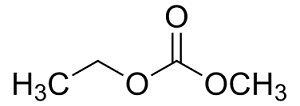Lithium Battery & Electrolyte Chemicals
HI! I’M ELEMENT AI.
Ethyl Methyl Carbonate

Product Description
Ethyl methyl carbonate is a chemical that serves various industrial applications owing to its properties.
Product:
Ethyl Methyl Carbonate
CAS:
623-53-0
Synonym:
Carbonic acid ethyl methyl ester
Structure:

Typical Characteristics
Appearance
Clear colorless liquid
Boiling point
101 °C
Density
1.006 g/cm3
Melting point
-55 °C
Molecular Weight
104.10
Purity
99%
Refractive index
1.378
Uses, Applications & Markets
Key applications
get a quote
We Offer Ethyl Methyl Carbonate
in various grades
A few of the grades available are listed below:



Ethyl Methyl Carbonate used in many
industry applications
Ethyl methyl carbonate, with the chemical formula C4H8O3, serves various industrial applications owing to its properties. Here's a breakdown of its main uses:
- Solvent: Ethyl methyl carbonate is widely used as a solvent in different industries such as electronics, pharmaceuticals, and coatings. Its low toxicity, high boiling point, and good solvency make it suitable for dissolving various substances.
- Lithium Battery Electrolyte: It is commonly employed as an electrolyte additive in lithium-ion batteries. Ethyl methyl carbonate helps improve the performance and stability of lithium-ion batteries by enhancing the formation of the solid electrolyte interface (SEI) layer and reducing battery degradation.
- Chemical Intermediate: Ethyl methyl carbonate serves as a versatile intermediate in organic synthesis. It participates in various reactions such as esterification, transesterification, and carbonylation to produce a wide range of organic compounds used in the synthesis of pharmaceuticals, agrochemicals, and specialty chemicals.
- Plasticizer: In the plastics industry, ethyl methyl carbonate can be used as a plasticizer, particularly in polyvinyl chloride (PVC) formulations. It helps improve the flexibility, durability, and processability of PVC products such as pipes, cables, and vinyl flooring.
- Electronics: Ethyl methyl carbonate finds application in the electronics industry as a component in electrolytes for lithium-ion capacitors and lithium-ion batteries. It contributes to the performance and safety of these energy storage devices, making them suitable for various electronic applications.
- Pharmaceuticals: It is utilized in the pharmaceutical industry as a solvent, co-solvent, or reaction medium in the synthesis of pharmaceutical intermediates and active pharmaceutical ingredients (APIs). Ethyl methyl carbonate's low toxicity and good solvency properties make it suitable for use in pharmaceutical formulations.
- Surface Coatings: Ethyl methyl carbonate may be employed in surface coating formulations such as paints, varnishes, and lacquers. It can act as a solvent or coalescing agent, helping to dissolve other coating components and improve the film-forming properties of the coating.
- Chemical Analysis: In analytical chemistry, ethyl methyl carbonate can be used as a solvent or reagent in various analytical techniques such as chromatography and spectroscopy. It facilitates the separation, identification, and quantification of organic compounds in complex mixtures.
- Adhesives and Sealants: Ethyl methyl carbonate is sometimes incorporated into adhesive and sealant formulations to improve their adhesion, cohesion, and flexibility. It can act as a solvent or plasticizer, enhancing the performance and workability of these products.
- Research and Development: Ethyl methyl carbonate plays a significant role in research and development activities across different industries. It enables scientists and engineers to explore new materials, processes, and applications, contributing to innovation and technological advancement.